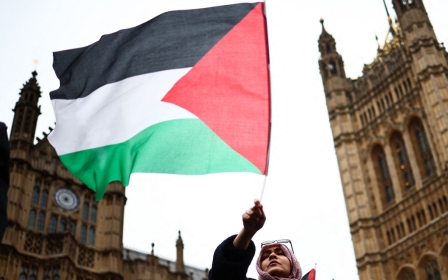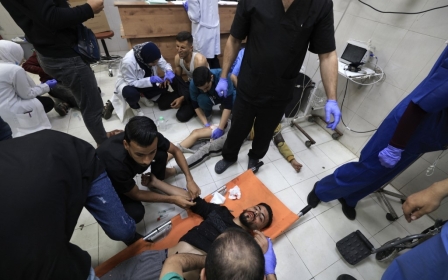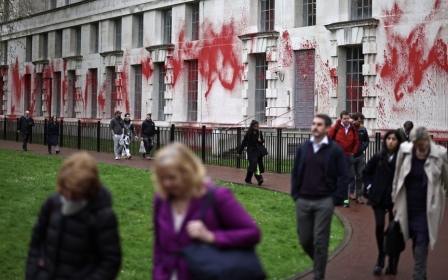War on Gaza: UK legal challenge over arms sales to Israel revived in High Court
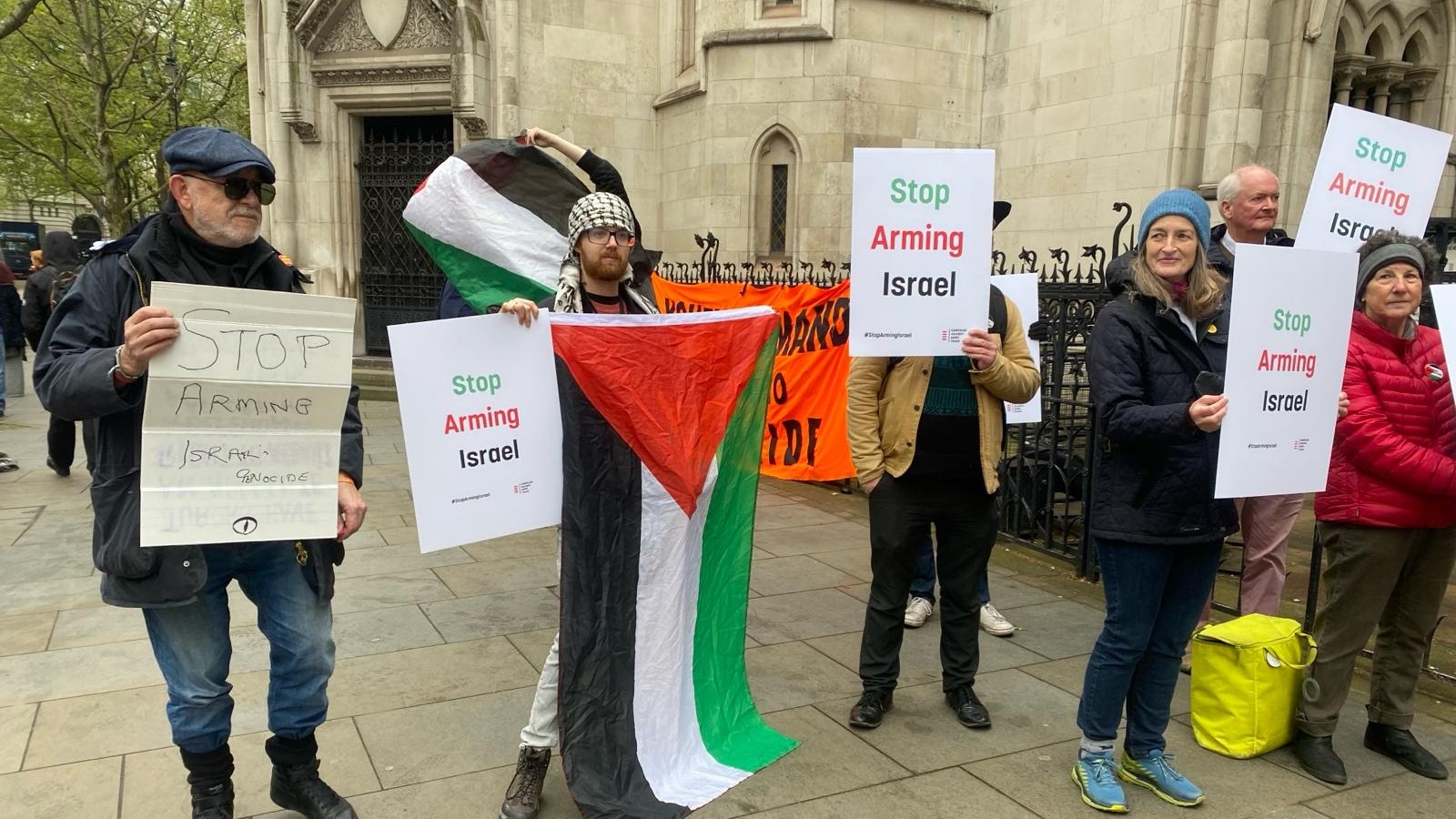
A legal challenge to UK arms exports to Israel was revived in the High Court on Tuesday, with further details revealed about the government's decision-making over the sales since October.
The case, filed in December by the Palestinian human rights organisation Al-Haq and the UK-based Global Legal Action Network (Glan), was dismissed in February.
But on Tuesday, with an opportunity to appeal that decision, the groups were granted an expedited judicial review hearing of the government’s export licence process, scheduled for October.
“The world has watched as 34,000 people have been killed, and more are being killed every day," said Charlotte Andrews-Briscoe, a lawyer with Glan. "Over the weekend, a single strike in Rafah killed 17 children. The case for urgency has never been clearer."
The Department for Business and Trade declined to comment, citing ongoing legal proceedings.
New MEE newsletter: Jerusalem Dispatch
Sign up to get the latest insights and analysis on Israel-Palestine, alongside Turkey Unpacked and other MEE newsletters
It was revealed for the first time publicly during Tuesday's proceedings that the UK government decided on 8 April to continue arms sales to Israel, the day before Foreign Secretary David Cameron told reporters about it during a press conference in Washington, DC.
Glan have said that new documents filed in the case show that the 8 April decision did not factor in the attack on the World Central Kitchen convoy which killed seven aid workers, including three British nationals, a week before.
Instead, the decision was based on a Foreign Office assessment of Israel's compliance with international humanitarian law between 18 December and 29 February.
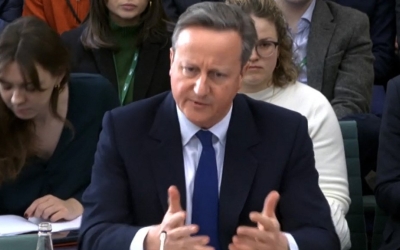
During that period, the International Court of Justice delivered its interim ruling, ordering Israel to abide by its provisional measures, and UN experts called for a halt of arms exports to Israel that would be used in Gaza, saying the transfers likely violated international humanitarian law.
It also included the 18 January Israeli military hit on a compound in Gaza which was housing British doctors and other staff members of the UK-based charity Medical Aid for Palestinians and the US-based International Rescue Committee.
A UN investigation found that the site, whose coordinates had been shared a month earlier with Israel, was likely hit with UK and US-manufactured parts and weapons.
Cameron received the assessment of the earlier period on 28 March and concluded on 3 April - two days after the WCK attack - that it was not necessary to suspend arms export licences, according to court documents cited by Glan.
On 8 April, Trade Secretary Kemi Badenoch, having received Cameron's recommendations, decided not to suspend licences and continue granting new ones.
Gearóid ó Cuinn, Glan's director, told MEE that it was clear from court filings that the government has the ability to conduct rolling investigations as incidents occur, but chose not to when it came to the WCK attack.
Middle East Eye has asked the Foreign Office to comment.
Drawing out details
Speaking in court, government lawyers said the Foreign Office had been producing assessments of Israel's compliance with international humanitarian law every two weeks earlier in the conflict, but that there had "been a hiatus" of that process.
Court documents suggest five such assessments have been made between 18 December, the first time after 7 October the government decided to continue arms sales to Israel, and 8 April.
Cuinn said it was apparent that the government had been using UN bodies, human rights groups and other civil society organisations to make its assessments which raised questions about how sales had continued.
"This means that they are getting an avalanche of consistency that what is happening there is in breach of international humanitarian law which makes the outcome that they arrive to, after considering all of this, all the more concerning," he said.
According to the Campaign Against the Arms Trade, the British government has licensed at least £472m worth of military exports to Israel since May 2015, including for components of the F35 aircraft which Israel has used to bomb Gaza.
The true figure is likely much higher because it doesn’t include items sold under opaque open licences which keep the value of arms and their quantities secret.
Before Tuesday, the challenge had already drawn out previously unknown details about the goverment's internal deliberations over arms sales to Israel since 7 October.
A court document filed in the case by the Deparment for Business and Trade in January showed that Foreign Office officials had been concerned as early as November over Israel’s conduct in the war, a detail which had not been clear from Cameron's testimony that same month to the Foreign Affairs Committee.
During the testimony, Cameron had said he was worried that Israel had breached international humanitarian law, but that he could not “recall every bit of paper” and it was not his job to make a “legal adjudication”.
'If we had the most rigorous arms control regime in the world, there wouldn't need to be a court case'
- MP Richard Burgon
The evidence made it clear that Cameron was given the final decision as to whether he believed Israel was committed to complying with the law and that he had advised the business department in December not to suspend export licences for UK arms sales to Israel.
Standing outside the High Court on Tuesday, two Labour MPs said they had come to support the push for the judicial review and called on the government to be more transparent about how arms sales decisions are made.
"The government should release all the legal advice. It’s something members of parliament, and lawyers and civil society groups have been asking for for weeks now," Imran Hussain, the MP for Bradford East, told MEE.
Richard Burgon, MP for Leeds East, said the answer repeatedly made by officials in parliament that the UK has the most robust arms regulatory system in the world "doesn't fill MPs or the public with confidence" and said reforms were necessary.
"If we had the most rigorous arms control regime in the world, there wouldn't need to be a court case about whether or not UK arms are being used in war crimes carried about by the Israeli government," Burgon told MEE. "The public deserves to know."
Middle East Eye delivers independent and unrivalled coverage and analysis of the Middle East, North Africa and beyond. To learn more about republishing this content and the associated fees, please fill out this form. More about MEE can be found here.


